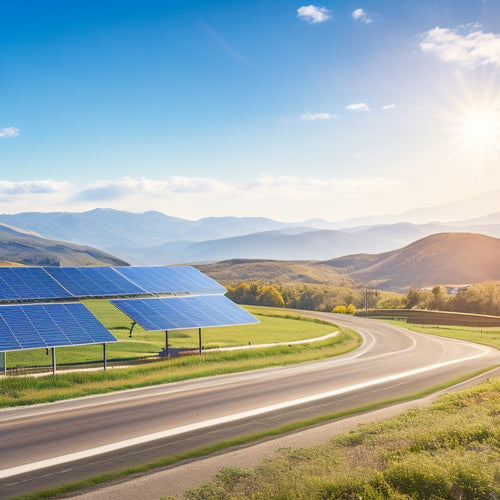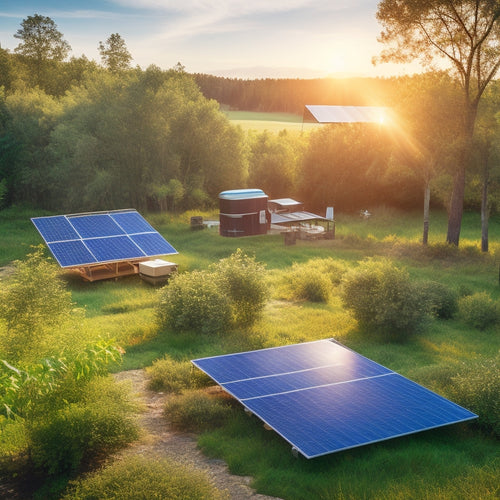
Boost Efficiency: 7 Solar Panel Tips 2023
Share
By fine-tuning your solar panel system, you can greatly enhance its efficiency. Optimizing panel angles, for instance, can improve energy capture, while choosing high-efficiency panels can generate more power per hour of sunlight. Minimizing shading, cleaning panels regularly, and monitoring performance closely are also essential for maximizing energy output. Upgrading to smart inverters and considering seasonal adjustments can further optimize your system. By implementing these strategies, you'll be well on your way to revealing your solar panel system's full potential and reaping the benefits of increased energy production and reduced bills - and that's just the beginning of what you can uncover.
Overview
- Optimize panel angles seasonally to maximize energy capture, with steeper angles in summer and shallower angles in winter.
- Choose high-efficiency panels with conversion rates above 20% to generate more energy per hour of sunlight.
- Minimize shading through thorough analysis, innovative roof design, and regular vegetation management to maintain efficiency.
- Clean panels regularly, ideally every 6-12 months, to remove dust and debris that reduce energy output.
- Monitor performance closely to identify potential issues and opportunities for enhancement through data analysis and tracking.
Optimize Panel Angles Matter
Your solar panel's performance hinges on its angle, as it directly impacts the amount of energy it can capture from the sun. To maximize energy production, you need to optimize your panel's orientation.
Regular cleaning Clean Panels for Maximum Energy also plays an essential role in maintaining peak performance. The ideal angle varies depending on your location and the time of year.
In the summer, a steeper angle allows your panel to capture more direct sunlight, while a shallower angle is better suited for winter months when the sun is lower in the sky.
Proper panel orientation also guarantees even sunlight exposure, reducing hotspots and enhancing overall efficiency.
Choose High-Efficiency Panels
Optimizing panel angles is just the beginning of maximizing your solar panel's energy production.
To take it to the next level, you need to choose high-efficiency panels that can generate more energy per hour of sunlight. Modern panel technology has made significant advancements in recent years, resulting in higher energy output.
For instance, high-efficiency silicon solar cells can achieve conversion rates over 26% high-efficiency silicon, making them suitable for off-grid systems. Look for panels with high-efficiency ratings, typically above 20%.
These panels use advanced materials and designs to capture more sunlight and convert it into usable energy. By choosing high-efficiency panels, you'll be able to generate more power with fewer panels, saving you space and installation costs.
This means you can achieve energy independence faster and enjoy the freedom that comes with it.
Minimize Shading Effectively
Most solar panels are installed in areas with some degree of shading, which can greatly reduce energy output. To minimize this effect, you should conduct a thorough shade analysis before installation. This will help identify potential shading issues from nearby structures or vegetation.
By incorporating plant management strategies, such as trimming trees, you can reduce shading and optimize energy production. Vegetation growth can also cast shadows, decreasing solar efficiency and attracting wildlife site assessments, so it's crucial to address these issues proactively.
Consider innovative roof design and installation techniques that maximize panel exposure to sunlight. Shading solutions like panel tilting or using bifacial panels can also be effective.
Clean Panels Regularly
Dust, dirt, and debris accumulating on your solar panels can greatly reduce their energy output, making regular cleaning an essential maintenance task.
You should determine the ideal cleaning frequency based on your location and climate. If you live in a dusty or polluted area, you may need to clean your panels more frequently.
A good rule of thumb is to clean your panels every 6-12 months, but this may vary depending on your specific situation.
Create a maintenance schedule to guarantee you don't forget to clean your panels. By doing so, you'll be able to maximize your energy output and enjoy the full benefits of your solar panel system.
Monitor Performance Closely
Regularly reviewing your solar panel system's performance is crucial to identifying any potential issues before they escalate into major problems.
You'll want to track key performance metrics, such as energy output, temperature, and voltage, to guarantee your system is operating at peak levels. By analyzing this data, you'll be able to pinpoint any inefficiencies or malfunctions and take corrective action.
This close monitoring will also help you identify opportunities to enhance your system's performance, such as adjusting the panel's angle or cleaning the panels more frequently.
Through data analysis, you'll gain a deeper understanding of your system's strengths and weaknesses, allowing you to make informed decisions to maximize your energy independence.
Upgrade to Smart Inverters
Upgrading to smart inverters is an essential step in optimizing your solar panel system's performance.
You'll be able to tap into the latest smart technology, which enables real-time monitoring and control of your energy production. This means you can identify and fix issues quickly, maximizing your energy savings.
Smart inverters also provide advanced features like remote software updates, grid support, and data analytics. With this level of control, you'll be able to make data-driven decisions to optimize your system's performance and reduce your energy bills.
Consider Seasonal Adjustments
Most solar panel systems are installed at an ideal angle to capture sunlight during the summer months, when the sun is high in the sky.
However, you should consider adjusting your solar panels' tilt to optimize energy production during winter. Winter positioning can increase energy output by up to 45% compared to a fixed summer tilt.
Location factors, such as trees or buildings, can impact your system's performance, so adjust accordingly.
Weather impacts, like snow or debris, can also affect energy production, so incorporate regular maintenance schedules into your routine.
Frequently Asked Questions
Can I Install Solar Panels on a Metal or Clay Tile Roof?
You can install solar panels on a metal or clay tile roof, but you'll face unique installation challenges. Verify roof compatibility by evaluating the roof's structural integrity, choosing suitable mounting systems, and considering additional waterproofing measures to guarantee a secure and efficient installation.
How Do I Determine My Solar Panel System's Warranty Details?
Scan your solar system's silver seal, scrutinizing documents for warranty duration, and carefully craft a claim process plan, so you're prepared to utilize hassle-free help when you need it, ensuring your freedom from frustration.
Are Solar Panels Affected by Extreme Weather Conditions?
You're right to wonder if solar panels can withstand extreme weather; fortunately, they're designed to be durable and resistant to harsh conditions, with most manufacturers ensuring their products can handle extreme weather impact, providing you with the freedom to utilize clean energy.
Can I Add More Panels to My Existing Solar Panel System?
You can expand your existing solar panel system, but first, you'll need to verify solar panel compatibility and investigate system expansion options, considering factors like inverter capacity, wiring, and roof space to determine the feasibility of adding more panels.
Do Solar Panels Work During a Power Outage?
You're wondering if solar panels work during a power outage? Unfortunately, they don't, as they're grid-tied and shut down for safety reasons. However, you can consider installing a battery backup system or a solar generator as power outage solutions to guarantee energy independence.
Ready to Buy
As you utilize the power of the sun, remember that every degree of optimization is a ray of opportunity. By fine-tuning your solar panel setup, you're not just enhancing efficiency - you're revealing a brighter future. The 7 tips outlined above are the keys to accessing your system's full potential. Now, shine on and watch your energy savings soar, illuminating the path to a cleaner, greener tomorrow.
Related Posts
-

Is Switching to Green Energy Solutions Easy
Switching to green energy solutions isn't just easy; it's also beneficial. You can greatly cut utility costs and enjo...
-

Replacing Old Appliances With Sustainable Alternatives
Replacing old appliances with sustainable alternatives can change your home into an energy-efficient space. Not only ...
-

Top Off Grid Solar Batteries for Renewable Energy
When seeking top off-grid solar batteries for renewable energy, consider options with advanced battery chemistry, suc...


